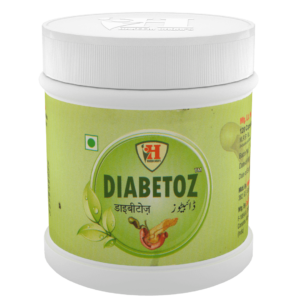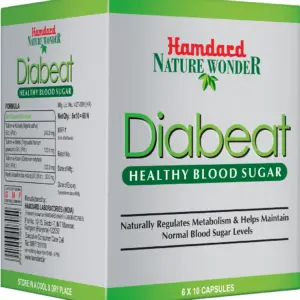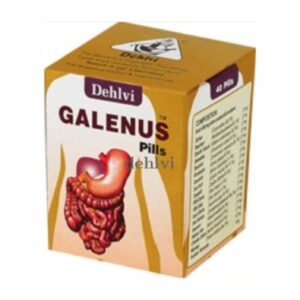Ingredients
Each 500 mg capsule contains: Nymphaea lotus Extract 100 mg, Cinnamomum zeylanicum 100 mg, Momordica charantia Extract 100 mg, Eugenia jambolana Extract 100 mg, Ficus racemosa Extract 100 mg, Gymnema sylvestre Extract 100 mg, Trigonella foenum-graceum Extract 100 mg, Tinospora cordifolia Extract 100 mg and Asphaltum Extract 200 mg
 DIABETOZ
DIABETOZ
 Hamdard Diabeat Capsule, 100 Capsules
Hamdard Diabeat Capsule, 100 Capsules
Diab-Eaze Capsule (60 Caps)
Original price was: ₹ 300.00.₹ 240.00Current price is: ₹ 240.00.
-20%Diab-eaze is a comprehensive herbal formulation containing time-tested and anti-diabetic herbs that have been recommended for more than 5000 years in Ayurveda and Unani system. These medicinal herbs make Diab-eaze a comprehensive approach to the management of diabetes mellitus. It balances blood sugar levels, thereby reducing or removing the need for insulin or hypoglycemic medication. Furthermore, it reduces cravings for sweet foods, improves circulation, especially to the feet and hands and improves blood flow to optic nerves to prevent diabetes-related eye diseases. It also helps promote symptomatic relief of complaints like weakness, giddiness, pain in legs, body ache, polyuria and pruritis. Diab-eaze does not contain any form of sulfonamides or biguanides (often found in allopathic drugs). It makes it possible to avoid the side effects most current with these products (skin problems or excessive lactic acid).
Indications
- Diabetes Insipidus
- Diabetes Mellitus
- Glycosuria
- Incontinence
- Polyuria
Dosage
2 capsules with water preferably after meals as a dietary supplement or as directed by your health professional.
Precautions
Many people still believe that eating too much sugar causes diabetes. This misconception arises because diabetes is diagnosed by measuring blood sugar (glucose). But dietary sugar is only part of the picture. A diet rich in certain high-carbohydrate foods — those low in fibre and with a high glycemic index — increases the risk of Type 2 diabetes, at least in those predisposed to it. Foods that seemed to pose the greatest risk are white bread, white rice, potatoes, and sugary soft drinks. In contrast, whole-grain breads and cereals (rich in fibre and with a lower glycemic index) appear to reduce the risk of diabetes. Excessive amounts of carbohydrate-rich foods with a high glycemic index puts pressure on the pancreas to produce more of the hormone insulin, which stimulates the body’s cells to take in and store glucose. Over time, the body may become resistant to insulin. In such insulin-resistant people, the cells become less and less sensitive to insulin. This is characteristic of Type 2 diabetes. Of course, not everyone on such a low-fibre, high-starch diet develops diabetes. There seems to be a genetic predisposition to diabetes, which may be exacerbated by this kind of diet. Obesity is probably the leading risk factor for Type 2 diabetes. Family history of the disease, advancing age, and lack of exercise are other important factors. The mineral magnesium has a protective effect against diabetes. A few studies have suggested that this mineral improves insulin sensitivity. But since whole grains are rich in magnesium, it’s hard to say whether the proposed benefit is due to something else in the grain (notably its fibre) or the mineral.
Terms and Conditions
We have assumed that you have consulted a physician before purchasing this medicine and are not self medicating.






Reviews
There are no reviews yet.